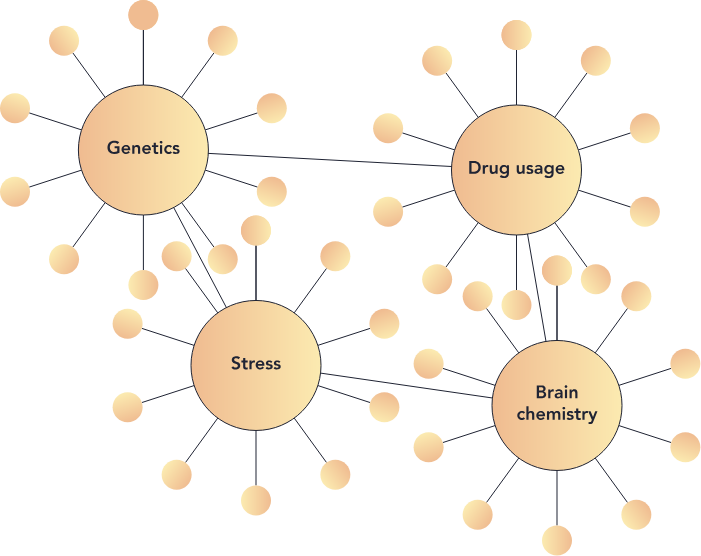Home - Paranoia Disorder
Expert care to overcome your Paranoia Disorder
Get a personalized treatment plan online and start feeling like you again with medication, therapy or both.
*Call for a free and confidential assessment. Insurance may cover 100% of the cost.
- paranoia
What is paranoia?
Paranoia is thinking and feeling like you are being threatened in some way, even if there is no evidence or very little evidence.
Paranoia is a specific thought process that causes irrational suspicions about individuals or a complete mistrust of people. Paranoia can often make individuals feel like they are being singled out and persecuted or that someone or something is out to get them. The mental health disorder can make people feel as though there is a physical threat to their life even if they are in a situation that isn’t dangerous.
Paranoia is a personality disorder characterized by a pervasive pattern of unwarranted distrust; it has been estimated that from 2.3% to 4.4% of Americans suffer from paranoia. It is thought to be more common among men than in women. The fantastic care team here at Park Mental Health San Diego will always sit down with you and learn everything about your unique circumstance before setting out any treatment options. This way, we can give you the most practical and effective support that works for you.
It’s been estimated that from 2.3% to 4.4% of Americans suffer from paranoia. It is thought to be more common among men than in women.
If you have found yourself or a loved one experiencing any of the signs or symptoms of anxiety, please do get in contact with a member of our team to receive the care and help you need.
What causes paranoia?
Paranoid feelings are entirely natural and are part of the human experience when individuals feel vulnerable or in highly stressful situations. For example, if you walk home late at night alone and believe you are being followed even though you aren’t. Paranoid feelings are usually not a cause for concern as long as they go away once you are out of the situation that caused them.
Paranoia disorder will generally occur because the individual already has personality disorders or other mental health illnesses such as schizophrenia. Often the cause will be a combination of factors which include:
- Stress
- Brain chemistry
- Genetics
- Drug usage
The use of specific drugs such as methamphetamines can cause extreme paranoia, delusions, and behavior. Other illicit medications such as PCP and LSD can additionally lead to paranoid thoughts.
Every person is different and can experience a range of symptoms; this is why here at Park Mental Health San Diego, we work with you to create a treatment program that has been specifically designed and tailored to fit your needs and requirements. Allowing us to ensure you are receiving the highest quality of service and the best possible outcome from our care and support.

Symptoms and Signs of Paranoia
Paranoia will manifest itself differently for everyone; no two experiences are ever the same; however, there are usually common themes to be on the lookout for. Below, we have mentioned a few generic signs and symptoms; if you are a loved one who has been experiencing any of these, please do not immediately jump to pre-diagnose yourself with paranoia disorder. However, we would advise you to have a check-up to be on the safe side.
If you are diagnosed with paranoia disorder, try not to worry. There are several treatment options that are data-backed to ensure significant improvement of overall well-being and your general outlook on life.
Mental signs and symptoms to look out for:
- Easily offended
- No trust in others
- Cant cope with criticism
- Defensive
- Aggressive, hostile
- No confidence
- Suspicious
- Difficult to forgive or forget
- Trouble letting your guard down
- Paranoid
Physical signs and symptoms to look out for
- Isolation
- Social withdrawal
- Physical harm
- Body dysmorphia

Examples of paranoid thoughts
Paranoid thoughts will vary with each unique individual the same way the signs and symptoms will. Paranoid thoughts can range from mild to severe; however, this depends purely on the individual, and until diagnosis, this is not something that can be determined.
Below we have listed a few common paranoid thoughts that individuals may experience:
They are in danger
Individuals who experience paranoia may believe that someone may be after them, want to hurt or steal from them usually this will come in the form of someone from the government, the FBI an individual of power.
Isolation
Individuals may believe that their peers or random people that they may walk past or sit next to on the train are attempting to exclude them from groups and activities to make them feel uncomfortable or unwanted.
Alert
They feel like everyone is constantly looking at them for no reason. Someone may unintentionally glance in their direction and the individual experiencing the paranoid thoughts may believe that they are staring at them. That, in particular, can cause the individual’s anxiety to increase, especially if they are unable to remove themselves from the situation.
Conscious
A common symptom for individuals suffering from these intrusive thought patterns is that they believe their loved ones, friends, and work peer are laughing at them. Making jokes at their expense within informing them of the joke. If two or more family members we to laugh at an inside joke about a completely different situation, the individual could take this as them laughing at something they have done or said.
Interpretation
We all at one time or another have been completely starring out into space and find ourselves making various facial expressions without even knowing that we are doing so. Often, people who suffer from paranoia will take this as a personal attack, they will believe that people are purposely making faces at them.

Know how to help in an emergency
If you have a loved one who may be experiencing paranoid thoughts, it can be challenging to understand how to help them effectively. You may be worried about how they react or possibly making something worse for them, particularly if you do not believe or agree with the current beliefs they are expressing.
It can be easy for you to shrug off your loved ones’ paranoid thoughts; however, please remember that these thoughts have developed from anxieties about a real-life situation. It can be beneficial for the both of you to calmly explore whether there is a basis for their fears, which can significantly help you understand how their thoughts have developed.
If a loved one has been unable to express their experiences, they may become significantly unwell before you realize they need medical intervention. If you have become worried, we would advise you to ring a crisis line to speak to an experienced member of our team to guide you through the process to begin receiving the vital care and help your loved one needs.
We would further advise that you look after your well-being and mental health. It can be extremely tough to experience a loved one in pain. To support them in their time of need, we will need you to be mentally and physically strong. We have a range of tips and plans that can help you support you through this journey too.

Selfcare tips for Paranoia
Practicing daily healthy habits that eventually become part of a typical pattern will lead to more effective outcomes regarding your mental health disorder. Creating a healthy routine that you know eases your symptoms when they get bad will help avoid any severe consequences. Below, we have recommended a few activities that immensely helped our past clients recover from Paranoia. It is essential to understand that while you may always have to live with your mental illness, you do not have to let it control your life.
- Try a new activity, preferably creative. Let your mind run free and see what you create
- If you can, try and stay active, even for just half an hour a day. Get your heart rate up and blood flowing around your body
- Eating a balanced diet can do wonders for your mind and your physical health
- Try to get enough sleep to ensure your mind and body can cope with your intrusive feelings and emotions if you are having an exceptionally bad day
- Write a journal when you are having particularly bad symptoms therefore you can identify what the possible trigger was
- Reach out to loved ones and trust friends for some social interaction
Therapy Treatment for Paranoia
If you have noticed that your paranoid thoughts have taken their toll on either you or a loved one’s life, we would always advise you to seek treatment and not suffer in silence. There is a range of therapy treatment options here at Park Mental Health San Diego which can all be tailored to suit your specific needs, requirements, and goals. Cognitive-behavioral therapy (CBT) is one of the most popular talking therapy with evidence-based data to back up the results. Other treatments can include family therapy, one-to-one counseling, psychodynamic therapy, and a range of art therapies.
Seeking help via therapy can ensure you learn vital lifelong skills that will help you manage your symptoms when going about your daily life. You can look forward to learning skill sets such as:
- Communication skills
- Help you consider alternative interpretations of your intrusive thoughts
- Identify how your thoughts and behaviors are affecting one another
- Learn how past or even current situation may have been starting point that led to the development of unhealthy thought patterns and behaviors, all of which could be maintaining your distress
- Reduce associated anxiety
- Develop new skill sets to handle intense emotions that may be disrupting your living life the way you chose
- Build your confidence to handle any challenging situations that may come your way
Paranoia is a complex disorder that affects each one of us differently, which is why we offer bespoke evidence-based approaches to help you develop skills effectively to aid you in breaking the negative cycles.

Medication Options for Paranoia
Often for mental health disorders such as paranoia, medication can be given as a second line of defense when combined with a therapy treatment to help you cope with your symptoms or another co-existing mental health disorder.
Depending on the severity of the individual’s paranoia symptoms, it is common for medication such as psychotropic to be prescribed along with therapy. Additionally, antipsychotic medication may be prescribed, especially if you have an underlying psychiatric condition like bipolar or schizophrenia.
There is never any shame in taking medication to help cope with the symptoms of your paranoia. Many people do not enjoy taking medication for their disorder and believe they have to hide; however, there is never any shame in taking medication to help cope with the symptoms of your paranoia.
Due to each experiencing unique symptoms, receiving the best results requires analyzing each person to the most effective medication. Our medical professionals at Park Mental Health San Diego will constantly research and finetuning treatment to ensure the individual response is at maximum effectiveness.
To ensure you receive the best results, your progress must be measured periodically. This allows us to make informed decisions based on data regarding your treatment.

Types of medication for Paranoia
There is currently no medication that has been approved by the Food and Drug Administration (FDA) to treat the mental health disorder paranoia personality disorder. However, antipsychotic medication may be used in conjunction with anti-depressants. This will often be prescribed for an existing co-occurring mental health condition that may contribute to the paranoid symptoms.
- Olanzapine
- Risperidone
- Paliperidone palmitate long-acting injection
- FAQ's
Your most frequently asked questions, answered.
What areas do you cover?
Park Mental Health Treatment covers the San Diego, California area. If you are unsure of whether you are near our facility, please either submit an online form or alternatively contact a member of our team today on 866-420-2524.
Do you provide outpatient care?
Yes, Park Mental Health Treatment has the facilities to cater for outpatient care. Alternatively, if you require inpatient care, we also have partnerships with facilities around the San Diego, CA area that can cater for inpatient therapies.
How do I get in contact?
To contact a member of our team, either complete an online form or call us directly on 866-420-2524.
What areas do you cover?
Park Mental Health Treatment covers the San Diego, California area. If you are unsure of whether you are near our facility, please either submit an online form or alternatively contact a member of our team today on 866-420-2524.
Need immediate help?
Call our 24/7 admission coordinator.
If you’re having a medical or mental health emergency, call 911 or go to your local ER.